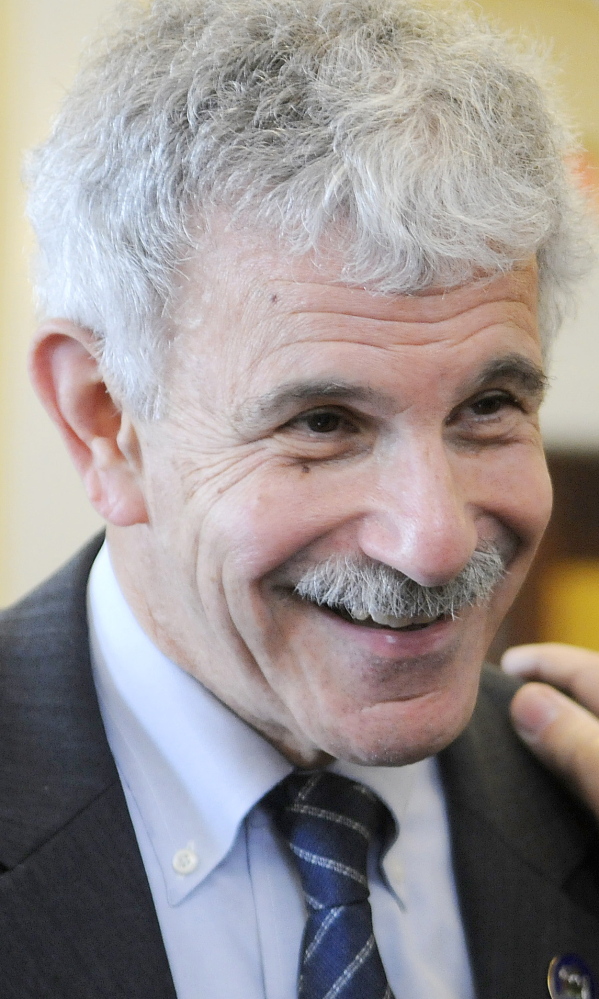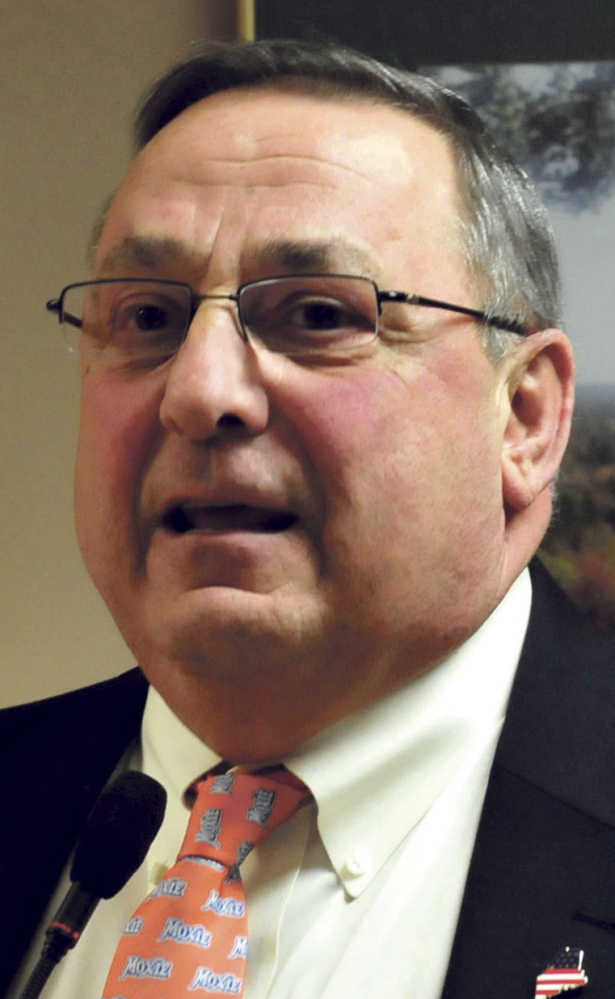AUGUSTA — David Trahan was listening to Gov. Paul LePage on the radio as he drove Monday. What he heard shocked him.
LePage blasted a fellow Republican, Sen. Roger Katz of Augusta, for fighting his effort to hold up $11.4 million in voter-approved conservation bonds unless lawmakers vote to approve an increase in timber harvested on state land to pay for energy efficiency programs for low-income people.
“I’m sorry. The man doesn’t like poor people,” LePage told WVOM, a Bangor radio station. “He’s my enemy.”
Trahan is a former Republican legislator who served with Katz and now is executive director of the Sportsman’s Alliance of Maine, which supports a Katz bill that would force LePage to issue the bonds. He said the governor was the one who made the debate about “the old and cold.” As a result of the governor’s words, he said, “We’re not talking about all these incredible projects” that risk losing funding.
“I don’t think Roger Katz is the enemy,” Trahan said. “I just think he has a disagreement with the governor, and he’s standing up for what he believes in.”
The conflict is surprising only because it’s so public. LePage is a conservative populist who uses “politician” as a pejorative and often criticizes legislators. Katz, a defense attorney known as a moderate, process-oriented lawmaker who is serving his third term, is the son of the late Bennett Katz, who was a Maine Senate majority leader.
Some have speculated that Roger Katz, 66, is positioning himself for a future run for higher office. When asked, he said any such decision is “some years away and the answer is probably not,” but if he were, “taking positions contrary to a Republican governor would not be a good career move.”
RELATIONS FRAYED
LePage and Katz have been on different sides of high-profile issues over the years since they were mayors of Waterville and Augusta. Both were first elected to their current state offices in 2010.
In 2009, the mayors squared off in a debate over a ballot measure that would have limited state spending growth based on population and inflation and required voter approval for larger increases.
LePage, mayor of Waterville from 2003 to 2010, was for it, saying, “We’ve given the state a blank check for way too long.” Katz, mayor of Augusta from 2006 to 2010, was against the measure, calling it “no way to govern.” After a budget that Katz helped negotiate passed in 2013, he released an op-ed column saying while he supports the governor’s policy goals, he was embarrassed by LePage’s “unfortunate tone,” which he said contributed to a “crisis atmosphere” at the State House in Augusta.
But relations between the two have never been as frayed as they are now. LePage’s comments and similar public criticism from House Minority Leader Ken Fredette, R-Newport, have made headlines and become a water cooler topic at the State House.
Rep. Matthew Pouliot, R-Augusta, called the governor’s comments about Katz “absolutely absurd.”
But Katz downplayed the conflict’s effect, saying in an interview he agrees with LePage on “most issues, just not this one.” The governor’s office declined to comment for this story.
“Good public policy comes from vigorous, respectful debate,” Katz said. “If we discourage that, we do so at our own peril.”
READING HIS DISTRICT
At home, Katz is one of Maine’s most popular legislators. With an endorsement from the Maine State Employees Association, which almost always backs Democrats, he got nearly 70 percent of votes in the 2014 election and nearly 12,000 people voted for him – second-most in his chamber only behind another moderate Republican, Tom Saviello of Wilton.
Many of his constituents are state workers, and he has broken with LePage to defend them. In 2012, Katz distanced himself from the governor after LePage said at a forum that middle managers in state government were “corrupt,” calling the governor’s remarks “demeaning and inexcusable.”
After LePage removed a mural from the Maine Department of Labor office in 2011, activists expressed opposition and some suggested forming a human chain to prevent it. LePage told WCSH-TV in Portland that he’d “laugh at … the idiots” if they did, prompting Katz and other Republicans to write an op-ed saying it was “another personal attack that only serves to further lower the bar of our public discourse.”
The bond battle is holding up money for a large project in Augusta. The Kennebec Land Trust was promised $338,000 in Land for Maine’s Future funding to preserve Howard Hill, 164 acres of land in Augusta that serves as a wooded backdrop to the State House. The nonprofit has a deal to buy the land from Sumner Lipman, Katz’s law partner, but it must raise $1.2 million before doing that and transferring the parcel, which is assessed at $171,000 for tax purposes, to the city.
Katz said it isn’t that project or his connection to Lipman that motivated opposition to LePage’s bond delay. He said that “no one, including the governor, should have the right to veto the will of the people.” He made that argument at a news conference in late April in support of his bill, which would force governors to issue bonds except in unusual circumstances.
It’s not the first time he has pushed back against LePage proposals that could hit the city of Augusta hard. Katz has been skeptical of plans that would cut $60,000 in state General Assistance funding from the capital city at current spending levels and move state offices out of leased space in the city to state-owned buildings, which Augusta says would jeopardize 5 percent of its property tax base.
Jim Melcher, a University of Maine at Farmington political science professor who lives in Augusta, said Katz “reads his district very well.” In Augusta, registered Democrats outnumber Republicans by roughly 1,000, making it hard for a successful Republican to be polarizing.
Katz represents Senate District 15, which includes Augusta, China, Oakland, Sidney and Vassalboro. He first won the seat in 2010 when he defeated Democratic Rep. Patsy Crockett. The district seat had been vacated by Democratic Senate President Libby Mitchell, who lost to LePage in the run for governor.
“This is not the bedrock conservative area of the state that some people represent,” said Rep. John Martin, D-Eagle Lake, a longtime legislator and former House speaker.
‘PART OF THE TEAM’
The same day that Katz unveiled his bill to force LePage to issue the bonds, Fredette held a news conference in which he criticized Katz, saying he was out of step with his party’s principles and “wants to fight with the governor.” Party members often disagree, but it’s rarely so public.
“I think that’s the really interesting thing about this, that the conflict’s so open,” Melcher said.
But last Wednesday in a State House hallway, Fredette was more conciliatory, saying “we all have a job to do,” that disagreements are “part of the process” and that “Roger’s part of the team.” Pouliot, the fellow Augusta legislator, said “absolutely there is a place” for Katz in the Republican Party, and that’s he’s “refreshing to a number of Republicans who consider themselves moderate.”
“Roger has legislated in a way that a lot of people appreciate,” Pouliot said. “Sometimes that’s not always popular with leadership, but it’s popular with the people.”
Don Roberts, a Kennebec Journal columnist and former Augusta city councilor who worked on both LePage and Katz’s campaigns in 2010, said the party is “damn lucky” to have Katz and said little will change after the public dust-up.
“Paul will react aggressively because that’s his style, and Roger will attempt to mollify those remarks and deflect them and get on with business,” he said.
That business includes Katz’s work on the Appropriations Committee, which must finalize a contentious budget, as Republicans control the Senate and Democrats lead the House. He’s also sponsoring a LePage bill seeking to prevent people from using food stamp benefits to buy “junk food” items such as candy and soda.
Katz said the recent conflict with LePage won’t affect his current job, saying he has a “friendly and warm” relationship with executive branch staff.
“Next week, we’ll be on to the next crisis in this building,” he said. “Life will go on.”
Send questions/comments to the editors.



